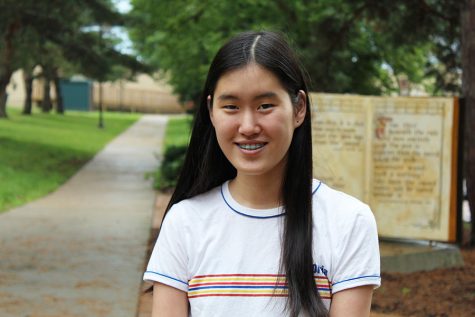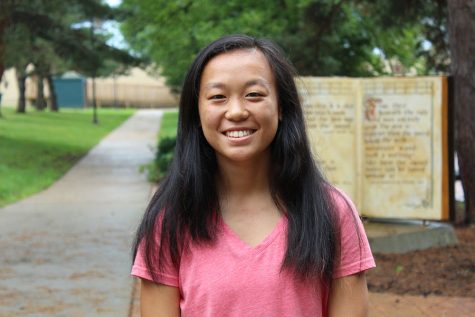Diversity or discrimination?
Students express their opinions on the benefits of a diverse class and how race plays a role in the college admissions process.
With college application deadlines looming, many students are scrambling to polish up their essays and nagging their teachers to finish recommendation letters. Most factors like test scores, GPAs, extracurricular activities and essays directly impact the admissions decision. However, one concerning factor in the college admissions process for some West students is something that no one can control: race.
Some Asian-American, African-American and white students at West believe that they are discriminated against in the college admissions process in some way.
Many American universities hold Asian-American students to a higher standard — they are expected to score about 140 points higher than white students, 270 points higher than Hispanic students and 450 points higher than African American students on the SAT to be seen as equal to these applicants, according to Thomas Espenshade and Alexandria Radford, authors of the book “No Longer Separate, Not Yet Equal.” This has proven to be frustrating to some Asian-American students, like Steven Yuan ’19.
“I’d say statistically, it does show that Asian-Americans, from a test score point of view and probably also academic point of view, have to accomplish more to be considered as an equal to people of other races,” Yuan said.
Additionally, it is difficult for Asian-Americans to stand out among peers of the same ethnicity, especially when many participate in similar activities. However, Yuan argues that this notion is a common misconception and that Asian-Americans do have special, unique activities that they are passionate about. He says that they do not all participate in “standard Asian” activities like piano, violin, tennis, robotics or math club, for example.
“I know a lot of Asian-Americans … They’re artists or painters. I know a lot of them who love to sing; I know a lot of them who love to act in plays. I’d say from my own experiences, Asian-Americans are just as diverse in terms of their interests and their talents as anyone else.”
African-American students face discrimination in the process as well, especially from their peers. Alaa Ali ’19, a Sudanese-American student, believes that minority students are not accepted solely because of their race; their qualifications are also taken into consideration. The undertone that these minority students only get accepted because of their race is undermining these students’ accomplishments and hard work.
“I feel like whenever there’s a student who gets into a very selective institution, there’s always that undertone … nobody wants to say that ‘Oh, well, they only got in because they were … a minority.’ And I feel like that’s pretty unfair,” Ali said. “I don’t think that a college would accept a student if they didn’t feel like they were right to go to that school, or … that they were under-qualified in any way.”
In addition to Asian- and African-Americans, Patrick Taylor ’20 believes that white students who aren’t recruited athletes and don’t have advantages such as legacy are also disadvantaged in the college admissions process, especially when institutions want to create a more diverse student body and put an emphasis on admitting students from different racial backgrounds.
Although these students think that it is unfair to solely take race into consideration when deciding which students to admit, some selective institutions like Harvard University argue that this is necessary in order to ensure a diverse student body. These institutions argue that a diverse class will prepare students for an “increasingly pluralistic world” and that race can be considered when assessing an applicant’s application.
Although Yuan agrees that Asian-Americans have a more difficult time in the college admissions process, he acknowledges that each university has its own institutional goals.
“[Universities] want to shape a diverse learning experience in the classroom … I’m sure that the admissions officers will see me beyond just an Asian person and … overall, they know what type of environment they want to have at their school,” he said. “Second of all, they know if I fit at that school, so I trust the judgment of admissions officers to make their call.”
Diverse classes come with a variety of benefits. Diversity in race, geographic location, socioeconomic status and interest and talents can expose students to people from various backgrounds.
“A lot of people can benefit from not being around people who are just like them. Just like how having a diverse high school is something that will help you moving forward, having a diverse university or college will help you [beyond school],” Ali said.
Harvard reported in a recent Pew survey that 71 percent of Americans said that efforts to embrace diverse student bodies were a good thing.
Taylor agrees with the majority on the results of the survey.
“It’s nice if you’re able to get all the class presidents from the U.S., but then you’re not getting a nice balance of personality types. So it’s good to make sure you get the student who is part of some quieter club but is still a very important and valid member of the community,” Taylor said.
Moving forward, these students all hope to see changes to affirmative action but also argue that it would be hard to make everyone happy with the changes. Yuan would prefer it to be based on socioeconomic status instead.
“It is shown that affirmative action tends to still benefit the wealthy, underrepresented minorities over truly disadvantaged, poor, underrepresented minorities, but once again diversity is also measured in racial diversity and from a school’s point of view, if you change it to a socioeconomic-based affirmative action, then you won’t get as much racial diversity,” Yuan said.
“If I had absolute power of the universe, I’d probably do it by income,” Taylor agreed. “Currently the system, I believe, is okay for the moment until colleges’ financial situations get better. It’s sad that some people have to be disadvantaged to allow others in. But on the other hand, the people who are given special advantages … the idea is that they come from backgrounds where they wouldn’t have [an] advantage.”
Yuan hopes that affirmative action will fix the way it classifies an individual into a group of people. He hopes that colleges truly do practice holistic admissions and focus on each person as an individual and the experiences they’ve gone through.
“I hope that one day people will be able to hopefully judge other people as MLK said, by the content of their character, not the color of their skin,” said Yuan.
Your donation will support the student journalists of West High School. Your contribution will allow us to purchase Scholarship Yearbooks, newsroom equipment and cover our annual website hosting costs.

Lily Meng is a senior at West High. It is her first year on staff and she is Online Co-Copy Editor. In her free time, she likes to play violin, write and...

Amy Liao, a senior at West, is a third-year staffer and returning design editor for newspaper. She is looking forward to another year of Making Things...




Turner • Nov 21, 2018 at 5:43 am
Hello Admin,
It is very nice that your blog is providing information regarding the program. I want to aware you towards the “Disney Professional Internships 2018-19”. These internships provide the opportunities to learn from professionals, gain practical experience in their field.
Application Deadline is Varies.
For more information, you can go through –
https://www.biginternships.com/disney-professional-internships/